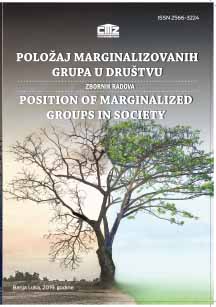INTERKULTURALNA KOMPETENTNOST NASTAVNIKA KAO FAKTOR EFIKASNOG OBRAZOVANjA UČENIKA ROMSKE PRIPADNOSTI
THE INTERCULTURAL COMPETENCE OF THE TEACHERS AS A FACTOR OF EFFECTIVE EDUCATION OF THE ROMANI STUDENTS
Author(s): Nikola MijanovićSubject(s): Social Sciences, Education, Sociology, School education, Ethnic Minorities Studies, Inclusive Education / Inclusion, Sociology of Education
Published by: CENTAR MODERNIH ZNANJA
Keywords: interculturality; competence; education; the Romani
Summary/Abstract: The school has become a bastion of interculturality, and its basic educational mission is a reliable factor in training the Romani students to live in economically, socially, culturally and geopolitically turbulent social conditions. From a plurality profiled and humanistic-oriented social context, it is imperatively imposed on the schools and teachers to train students for cohabitation, regardless of race, ethnicity, religion, language, culture, gender, socialness and any other diversity. It is certain that such requirements cannot be met, by prejudiced and stereotypically profiled teachers. Instead, new educational and multifaceted educational tasks must be met by flexible and professionally intercultural teachers, ready and able to apply different forms and strategies of teaching and learning, considering individual abilities, knowledge, experience and preferences of each student. It is indisputable that extremely demanding and delicate educational work with members of the Romani community implies, among other things, a special sensitivity, empathy, respect for their identity, personal subjectivity and a culturally recognizable system of values. Respecting these and other of their traditional values, the intercultural education of the Romanies must first have the seal of a highly developed humanistic society in which the promotion of diversity becomes an imperative of the time, and it involves the creation of a positive social climate in which individuals fully, consciously and responsibly accept the maxim: "others ". In accordance with these high-civilizational aspirations, the aim of this paper is focused on critical review and analysis of the necessary general, specific and individual competencies of teachers, who are expected to be able to create an optimal intercultural educational environment necessary for the effective education, development, emancipation and individual social integration of the Romani students.
Journal: DRUŠTVENE DEVIJACIJE
- Issue Year: IV/2019
- Issue No: 4
- Page Range: 99-109
- Page Count: 11
- Language: Serbian

